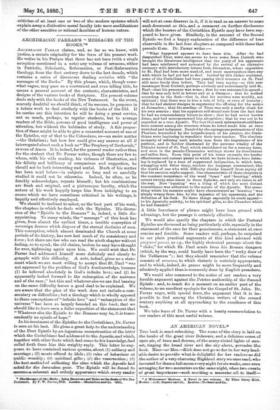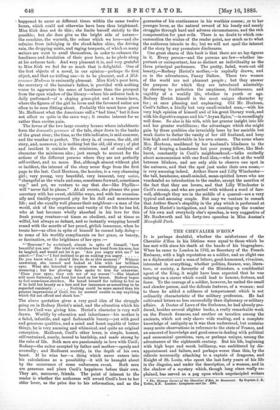AMERICAN NOVEL*
Teas book is most refreshing. The scene-oft-the story, is laid-on the banks of the _groat -river Delaware, and-a delicious sense.of open air, of trees and flowers, of-the many-tinted-lights of sun. -set, tinging the broad river and the -sky above, pervades Ahe book. Miss—or Mrs.—Kirk -does mot -go so dar in _her' veryland=able desire to provele whatis delightful dor ;her readersas.did the author of a -very.charming Highland story we once read, who invented for theme follonooneverynight for six weeks, once even -arranging for two moonrises on-the same night, when two events -of great importanee—each aneriting .a moonrise all to itself—
happened to occur at different times within the same twelve hours, which could not otherwise have been thus brightened. Miss Kirk does not do this ; she limits herself strictly to the possible; bat she does give us the bright side of nature— the sunshine, the warmth, the colour which we love—and she refrains from indulging in the cloud-laden skies, the driving rain, the dropping mists, and raging tempests, of which so many writers are wont to avail themselves, in order to enhance the loneliness and desolation of their poor hero, as he plods along at his arduous task. And very pleasant it is, and very grateful to Miss Kirk we feel for so much that is delightful. One of the first objects of a novel, in our opinion—perhaps the first object, and that no trifling one—is to be pleasant, and A Midsummer Madness is eminently pleasant. Miss Kirk's poor hero, the secretary of the heroine's father, is provided with nothing worse to aggravate his sense of loneliness than the prospect from the open window of the library—where his arduous task is daily performed—of a sloping grass-plot and a tennis-lawn, where the figures of the girl he loves and the favoured suitor are -often to be seen flitting about. Probably this must have given Mr. Medhurst what the Americans call a "bad time," but it does not affect us quite in the same way ; it creates interest for us rather than excites pain.
The lawns of the two large country houses whose inhabitants form the dramatis personce of the tale, slope down to the banks of the great river; the time, as the title indicates, is mid-summer, and the weather is perfect. The story is, of course, the old, old story, and, moreover, it is nothing but the old, old story ; of plot and incident it contains the minimum, and of analysis of character the minimum also ; just enough to account for the actions of the different persons where they are not perfectly self-evident, and no more. But, although almost without plot or incident, the interest of the story never flags from the first
page to the last. Cecil Hoxtoun, the heroine, is a very charming girl ; very young, very beautiful, very innocent, very naive, 4' changeful as the winds and seas, sometimes forward, sometimes
-coy," and yet, we venture to say that she—like Phyllis— will "never fail to please." At all events, she pleases the poor secretary with her sweet, childlike ways, and with her occasion ally and timidly-expressed pity for his dull and monotonous life ; and she equally well pleases their neighbour—a man of the world, sick of the emptiness and vanity of the life he has led, who at last becomes wholly absorbed in his love for this fresh young creature—at times so obedient, and at times so wilful, but always so defiant, and so instantly wrapping herself round with the mantle of her proud, girlish innocence, when he
treats her—as often in spite of himself he cannot help doing -to some of his worldly compliments on her grace, or beauty, or fascination, or the brightness of her eyes :— " 'Heavens !' he exclaimed, almost in spite of himself, 'how beautiful you are.' She tried to withdraw her band from his arm, but he laughed, and would not let it go. 'Are you angry with me ?' he
asked.—' Yes.'—' I feel inclined to go on making you angry Do you know what I should like to do at this moment ?' Without answering, she turned and looked at him with her brilliant eyes. What she intended to express was something portentous, menacing ; but her glowing face spoke to him far otherwise. Close your eyes ; they rob me of my senses ! '—She blushed still more furiously, and bent her head on her breast. Rodney began to feel conscience-stricken. He hated himself for talking to her as if he held her beauty as a lure and her innocence as something to be regarded carelessly Nothing could be more sacred than his present impressions of Cecil, but he seemed unable to say anything which did not offend and shock her."
The above quotation gives a very good idea of the struggle going on in Rodney Heriot's mind, and the education which his love for Cecil was giving him. Heriot's character is very well drawn. Worldly by education and inheritance—his mother is a faded, infantile, and aged fashionable beauty—yet with good and generous qualities, and a mind and heart capable of better things, he is very amusing and whimsical, and quite an original
-conception. Medhurst, Cecil's other lover, is simple, honest, self-restrained, manly, inured to hardship, and made strong by
the rubs of life. Both men are passionately in love with Cecil; Rodney—the suitor accepted by father and mother—openly and avowedly; and Medhurst secretly, in the depth of his own heart. If he wins her—a thing which never enters into his calculations as a possibility—it will be brought about by the occurrence of some unforeseen event. Both men
are generous and place Cecil's happiness before their own. They are, moreover, friends. The point of interest to the
reader is whether the authoress will award Cecil's love to her elder lover, as the prize due to his reformation, and as the guarantee of his continuance in his worthier course; or to her younger lover, as the natural reward of his lonely and manly struggles through hard and adverse circumstances, and the rich compensation for past evils. There is no doubt to which consummation the wishes of the reader point, nor much as to what the authoress intends to do; but we will not spoil the interest of the story by any premature disclosures.
One great charm of this book is that there are no lay-figures in it. Every person—and the persons are few—whether important or unimportant, has as distinct an individuality as the three principal performers. The pretty, faded, worn-out old beauty,—Rodney Heriot's mother,—is capitally drawn, and so is the adventuress, Fanny Dalton. These two women of the world are not pleasant people ; but they answer the purpose for which they are introduced admirably, by showing to perfection the emptiness, fruitlessness, and vapidity of a worldly life, whether in youth or age. Rodney Heriot himself is the most unique character by far ; at once pleasing and unpleasing. Old Mr. Hoxtonn, Cecil's father, a kindly but very small-minded man,—with his very high opinion of himself and of his great literary work, and with his digestive organs and his "Aryan Epics,"—is exceedingly well done. So also is his wife, with her greater insight into life and her greater worldliness ; the advantages which she might gain by these qualities she invariably loses by her amiable but weak desire to flatter the vanity of her old husband, and keep him high and comfortable in his own esteem. The scene where Mrs. Hoxtoun, maddened by her husband's blindness to the folly of keeping a handsome but poor young fellow, like Med.hurst, constantly in Cecil's neighbourhood,—talks excitedly about monomaniacs with one fixed idea,—who look at the world between blinkers, and are only able to observe one spot in the universe, and that the spot jest under their own noses,— is very amusing indeed. Arthur Snow and Lilly Winchester— the tall, handsome, small-minded, mean-spirited lovers who are vouchsafed no introduction to the reader, except the mention of the fact that they are lovers, and that Lilly Winchester is Cecil's cousin, and who are parted with without a word of farewell, although they are in the middle of a quarrel—are a very typical and amusing couple. But may we venture to remark that Arthur Snow's stupidity in the play which is performed at Rodney Heriot's instigation, and his counting-up the number of his own and everybody else's speeches, is very suggestive of Mr. Rushworth and his forty-two speeches in Miss Austen's _Mansfield Park.



































 Previous page
Previous page